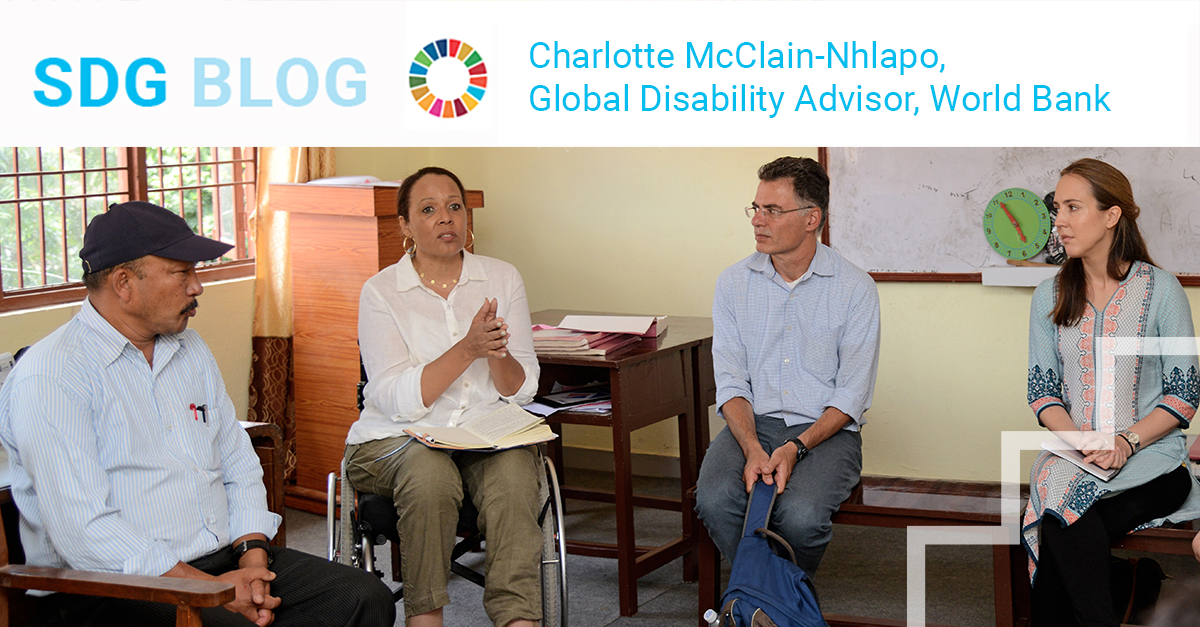This blog was originally posted on UN DESA Voice, SDG Blog, on June 1st, 2021
By Charlotte McClain-Nhlapo, Global Disability Advisor, World Bank
As the world continues to grapple with what it means to ensure an inclusive recovery, we must remember that persons with disabilities remain disproportionately excluded from accessing adequate health, education, transportation, and other basic services.
This year’s Conference of States Parties (COSP) to the Convention on the Rights of Persons with Disabilities (CRPD) could not be more timely. As we reach an inflection point in development, we must work towards a global recovery from the pandemic that is disability-inclusive and premised on the Convention’s principles, particularly those of respect, dignity, non‑discrimination, full and effective participation, accessibility, and access to services.
This pandemic, which continues unabated in so many places, has presented the world with a myriad of challenges that have set us back in achieving the Sustainable Development Goals, including those that explicitly refer to disability.
As the spread of COVID-19 slows in many places that have better vaccine access and as people begin to return to their pre-pandemic ways, we must remember that for many of them the pre‑pandemic reality was not one of accessibility and inclusiveness. It was not a world where persons with disabilities could fully and equally enjoy human rights and fundamental freedoms, as envisaged by the CRPD. As we plan for the future and the post-pandemic possibilities, let us not forget the long-term goal of ensuring a recovery that is inclusive, resilient to future shocks, and sustainable for all.
The World Bank’s COVID-19 Crisis Response Approach Paper shines a clear spotlight on the need for all stakeholders to be deliberate about accessibility and inclusion across all stages and areas of crisis response. The approach includes vaccination campaigns, employment opportunities, school re-enrollment, and other critical government services.
To this end, the World Bank has supported several West African countries to include vulnerable individuals and groups in national identity card programs, which are essential to accessing services, such as vaccinations, in most countries. To help broaden this approach to other regions, the World Bank recently launched a guidance note, “Creating Disability-Inclusive ID Systems”.
The World Bank has also provided technical assistance to several COVID-19 response projects to ensure they are disability-inclusive. For example, the Rwanda Vaccination Rollout now mainstreams disability inclusion throughout the project design. And while the work we’ve been doing is important, it’s not enough. We need the whole global community – international financial institutions, public and private sector actors, civil society, and academia – to do more.
Last March, as 85 per cent of children were affected by widespread school closures, the World Bank’s Inclusive Education Initiative (IEI) acted swiftly to highlight the impact of the COVID‑19 pandemic on children with disabilities given the dearth of information on disability-inclusive education from past pandemics, such as Ebola. Recognizing the vulnerability of children with disabilities to shocks and disruption, the IEI analyzed the multiple forms of exclusion they experience linked to education, health, gender and social exclusion.
Recognizing the urgent need to curate and circulate new knowledge, the IEI released an issues paper titled “Pivoting to Inclusion: Leveraging Lessons from the COVID-19 Crisis for Learners with Disabilities”. This paper highlights the emerging educational and social needs, barriers, and issues experienced by learners with disabilities. It focuses attention on the roles of teachers, parents, and caregivers that have changed drastically, leading to much uncertainty in supporting the continued learning of their students and children with often new and unfamiliar methods and technology.
Several of the recommendations presented in the IEI issues paper apply to other sectors and activities for a disability-inclusive recovery, including an equitable approach to ensure all persons are vaccinated.
As we envision and work towards an inclusive future that embodies the rights and dignity of all persons with disabilities, we need to:
- Include persons with disabilities and organizations of persons with disabilities in the planning from beginning to end in a meaningful way.
- Adopt a twin-track approach, meaning plan for inclusive mainstream solutions to benefit all while also planning activities that target persons with disabilities.
- Advance the principles of universal access to ensure increased access to physical, digital and basic services for persons with disabilities and ensure information is made available in multiple accessible formats.
- Scale up the collection of disability-disaggregated data to shape long-term, inclusive models going forward. With funding from the SDG Fund the World Bank has recently developed an e-course on collecting disability-related data.
As we emerge from this unprecedented global crisis, let us do so with a renewed sense of how we want to achieve the Sustainable Development Goals—with people and the planet at the centre, we have an opportunity to ensure equity, accessibility, and inclusion for all and that no one is left behind.

